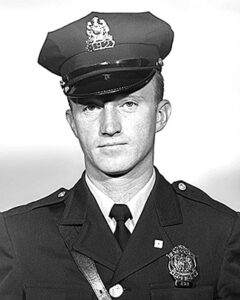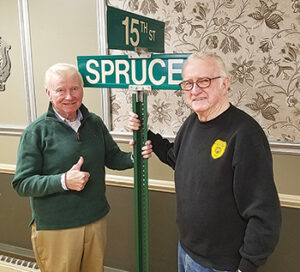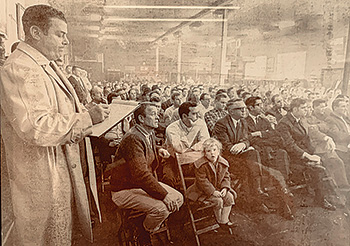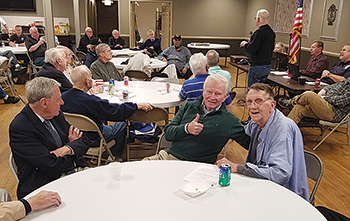By JEFF ROORDA
Executive Director/Business Manager
St. Louis Police Officers Association

He didn’t have wooden teeth or a powdered wig, but Jim Fitzgerald was most certainly the George Washington of the St. Louis Police Officers Association.
As you can imagine – perhaps better than any other generation of police officers before or since – the civil unrest and counter-culture that characterized the era made the 1960s a very tough time to be a cop.
During the height of the U.S. involvement in Vietnam, from 1963 to 1973, a total of 14 St. Louis Metropolitan Police Department (SLMPD) officers died in the line of duty, 10 of them by gunfire.
Then as now, police were vilified by certain segments of society, which often made them the target of antipathy and, frequently, the target of unprovoked violence.
And then as now, instead of standing alongside their officers, the police administration seized on the opportunity to intensely scrutinize their own, diverting attention and accountability from themselves to rank-and-file officers who bore the brunt of negative public opinion.
ORGANIZING POLICE OFFICERS
Enter Jim Fitzgerald, a feisty copper’s cop, who, like so many of his brethren, had grown weary of the persistent blame game and mistreatment of street officers coming out of police headquarters at 1200 Clark Ave. in the late 1960s.

Cops were treated very badly by the administration in those times. Terms like “goon squad” and “headhunters” as characterizations of Internal Affairs Division (IAD) investigators emerged during that era.
The notion of police officers unionizing in those days was considered heresy against the papal institution of the chief of police.
While police unions were common along the Eastern Seaboard, the idea of organizing among Midwestern police departments was still somewhat fanciful in the ’60s. Police unions, then, as now, were oft-maligned by politicians eager to make headlines.
Historically, unionizing police on the East Coast was itself highly politicized. Two future U.S. Presidents – Theodore Roosevelt and Calvin Coolidge – made names for themselves and political hay as union-busting “police reformers” in New York City and Boston, respectively, at the turn of the 20th century.
UNION BUSTING AT POLICE HQ
So it was that an attempt in October of 1945 for St. Louis city officers to organize under the banner of the American Federation of State, County & Municipal Employees (AFSCME) was crushed by the police administration with several of the would-be organizers jettisoned by the department.
Jim Fitzgerald knew that a similar fate lurked in the shadows for him or anyone else who initiated a Labor movement within the police department.
He did it anyway.
In 1968, Jim Fitzgerald, along with other detractors of the police administration, held exploratory meetings about unionizing the SLMPD at Tower Grove Park and – when the crowds started to swell – at the old VFW Hall on Kossuth Ave.
The police chief and his cronies saw the dissidents the same way King George saw the American colonists –– as insurrectionists and treasonous rebels.
And their response was Georgian as well: Crush the revolution at all costs!

The Inspector of Police at the time, Major Joseph Craft, was dispatched along with his “goon squad” to put down the rebellion. Craft and his stooges would very overtly stand on the parking lot of formational meetings of the union, snapping pictures of parked cars and their license plates. Then they strode into the gatherings as if they owned the joint and literally began “taking names” in the most visible manner possible.
A deep line was furrowed in the sand between the pro-Labor agitators and the pro-management sycophants. It was reminiscent of the line in the Harlan Coal Wars-inspired Pete Seeger folk classic, Which Side Are You On, that goes, “They say in Harlan County there are no neutrals there, you’ll either be a union man or a thug for J. H. Blair.”
Just imagine the pressure on Fitzgerald and his comrades to relent.
Even if the department leadership was smart enough not to act conspicuously on their McCarthy-esque list-making, those whose names made it into their dossier were certain to have an indelible blot on their records that would follow them for the entirety of their careers.
A BIG RISK
I recently chatted with retired Homicide Unit legend Joe Burgoon, who was Fitzgerald’s partner in Mobile Reserve from 1963 to 1969. He said of the early days of the Association, “It was a big risk. Guys like Jim knew they would have a black mark next to their name.”

In the case of the nascent days of the SLPOA, it was more like a scarlet letter than a black mark, and the scarlet letter was a “U” for unionizer.
Fitzgerald wore that letter proudly on his chest.
He wasn’t alone. Fitzgerald’s brother, Kevin, who was also in the Mobile Reserve, was actively involved in the early organizing efforts. Kevin actually designed the SLPOA logo we still use to this day.
Likewise, Bob Nichols, who went on to retire as a captain from the Maryland Heights Police Department after his time with SLMPD, served as the first vice president of the SLPOA.
Nichols spoke with me about Fitzgerald and the early days of the Association. “We were young and we thought we could take on the whole world. It was a very different time,” Nichols reminisced.
STILL FIGHTING
Perhaps it’s not so different than today, as we wage war with the police administration to force them to honor our union contract and return to the bargaining table.
But then, as now, the administration knew only one way to deal with Labor unions: complete annihilation.
Unable to resist their impulse to abuse their power, on Dec. 18, 1968, at the chief’s urging, the Board of Police Commissioners suspended the five elected officers of the newly created St. Louis Police Officers Association and decreed that, “All members of the association were joining at the risk of suspension,” according to a UPI news report at the time.
The use of overwhelming, excessive force to crush an uprising is what military historians would refer to as “asymmetrical warfare.”
The problem with asymmetrical warfare is that it creates martyrs.
And martyrs inspire the masses.
In his martyrdom, that’s exactly what Jim Fitzgerald did. He inspired the masses.
You can’t help but look at the bleached-out, sepia tone photo of the meeting of the Association at the VFW Hall the day after Fitzgerald and the others were suspended and not be struck by the way the crowd seemingly goes on into oblivion as Major Craft struggles futilely to scribe the names of all of the attendees. As I revel at that photo, I chuckle to myself, “Better get another pad of paper, a**hole.”
THE PASSING OF A HERO
Jim Fitzgerald died on Oct. 7.
He died a hero.
He served his country in the United States Army during the Korean War.
He worked as a police officer with the SLMPD for nearly a decade until he was squeezed out for his organizing efforts. He served the police department with distinction and acclaim, even once having to fatally shoot a stick-up man who tried to rob Fitzgerald when he was working on the old “decoy squad.”
After leaving policework, Jim made a good living selling cars and was born again in Christ, devoting his later years to ministering to the pale and downtrodden.
He raised a loving family that he leaves behind, better for his presence in their lives.
Jim’s legacy though, is memorialized in that vintage photo of his fellow officers rallying around him and the other suspended leaders of our fledgling union. They were all on notice. The heads were on the pikes.
Join the Association, the police administration menaced, and you’ll be decapitated too.
And what did Fitzgerald and almost every officer in the St. Louis Metropolitan Police Department do? They all showed up at that pivotal meeting and said, “You’ll have to take all of our heads.”
That was the birth of our union.
Now it’s Jim Fitzgerald’s epitaph.
Joe Burgoon said fondly of Fitzgerald, “He had my back and I had his and neither one of us ever got hurt.”
Perhaps we should make that our union motto.
It was certainly Jim Fitzgerald’s.


Thank-you for this article. It was timely for our family in dealing with the loss of him. He was an exceptional man! He went on after the police department to work in ministry and he ended up returning to county jails and state prisons to preach the gospel of Jesus Christ to those incarcerated. It’s hard to believe but being a police officer was just the beginning for him. We are forever grateful for this article.
It’s beautifully and honestly written.
– His grand-daughter.